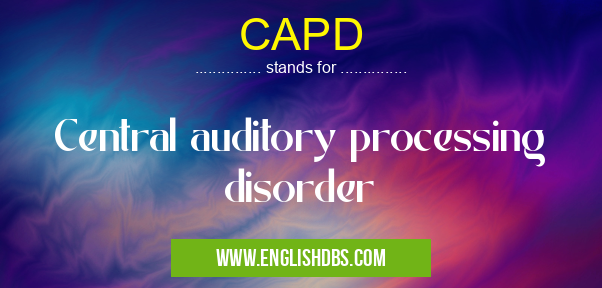What does CAPD mean in CLINICAL MEDICINE
Central auditory processing disorder (CAPD) is a neurodevelopmental disorder that affects how the brain interprets and responds to sound. People with CAPD have difficulty understanding verbal instructions, as well as recognizing subtle differences in sound such as pitch or rhythm. This can lead to problems understanding language-based tasks, like following directions or distinguishing between similar sounds. It can also cause difficulty with academic tasks such as reading or writing. CAPD is usually identified during childhood but can persist into adulthood.

CAPD meaning in Clinical Medicine in Medical
CAPD mostly used in an acronym Clinical Medicine in Category Medical that means Central auditory processing disorder
Shorthand: CAPD,
Full Form: Central auditory processing disorder
For more information of "Central auditory processing disorder", see the section below.
Causes of CAPD
The exact cause of CAPD is not known, although it is believed to be related to the development of the auditory system in the brain. Other factors that may increase an individual’s risk for CAPD include genetics, exposure to noise, or medical conditions such as attention deficit hyperactivity disorder (ADHD) and learning disabilities.
Symptoms of CAPD
Some common symptoms of central auditory processing disorder include difficulty understanding conversations in noisy environments, mishearing words or phrases when spoken quickly, struggling to distinguish between different voices, and having difficulties recognizing differences between similar sounds. Other signs may include speech and language delays, poor reading comprehension, and difficulty with critical thinking skills such as problem solving and reasoning.
Diagnosis & Treatment of CAPD
CAPD is typically diagnosed through a series of tests administered by an audiologist or other qualified professional. These tests measure different aspects of hearing including sound discrimination and recognition, speech identification in background noise, and determining the ability to localize sounds. Treatment for CAPD usually includes training on how to better process incoming information from audio sources like conversations or lectures; listening practice; environmental modifications such as louder/dimmer lighting; academic accommodations; speech therapy; counseling; and using hearing aids/assistive devices when necessary. In some cases medication may be prescribed if behavioral therapies are not sufficient for symptom management.
Essential Questions and Answers on Central auditory processing disorder in "MEDICAL»CLINICAL"
What is Central Auditory Processing Disorder (CAPD)?
Central Auditory Processing Disorder (CAPD) is an impairment in the way sound is perceived in the brain, which affects a person's ability to interpret and process auditory information. The disorder affects how individuals interpret verbal language, which can lead to difficulties in learning.
What are the causes of CAPD?
There is no single known cause for CAPD. Possible causes may include head trauma, hearing loss, genetic predisposition, premature birth, medical conditions such as autism or ADHD, language delay, or even environmental factors such as noise exposure.
Are there any signs and symptoms of CAPD?
Common signs and symptoms of CAPD include difficulty understanding conversation when there is background noise or multiple speakers present; difficulty with following directions; having difficulty paying attention to verbal information; difficulty with rhyming and distinguishing speech sounds. Other signs can include short-term memory problems and misinterpreting words or phrases.
How is CAPD diagnosed?
A Speech Language Pathologist usually completes a battery of diagnostic tests to assess the individual’s hearing sensitivity, auditory discrimination abilities, speech perception skills, and listening strategies. These tests are typically used to measure an individual’s auditory processing skills associated with their ability to pay attention and remember what they have heard.
Is there any treatment for CAPD?
Yes! Treatment options for those with CAPD often includes remediation therapy from a Speech-language pathologist in order to improve listening skills as well as cognitive strategies that involve visual aids and other types of aids that will help enhance comprehension skills.
How long does it take for someone with CAPD to receive treatment?
It depends on the severity of the disorder and also on how long it has been since diagnosis was made. Typically it could be anywhere between 6 months to 1 year for appropriate treatment.
How do I know if my child has a CAPD?
Children who may have Central Auditory Processing Disorder may exhibit problems such as being easily distracted by background noise in school settings or having trouble following along when instructions are given verbally rather than visually. They may also have difficulty processing information accurately when rapid fire questions are ask quickly one after another during exams.
Final Words:
Central auditory processing disorder is a complex disorder that affects the way individuals interpret auditory signals from their environment. Although its causes remain unknown, there are various treatment options available that can help those living with CAPD manage their symptoms more effectively. It’s important for families dealing with this condition to remember that while it can require extra effort and patience at times, many people with CAPD go on to lead successful lives with appropriate support from professionals who specialize in this field.
CAPD also stands for: |
|
| All stands for CAPD |
